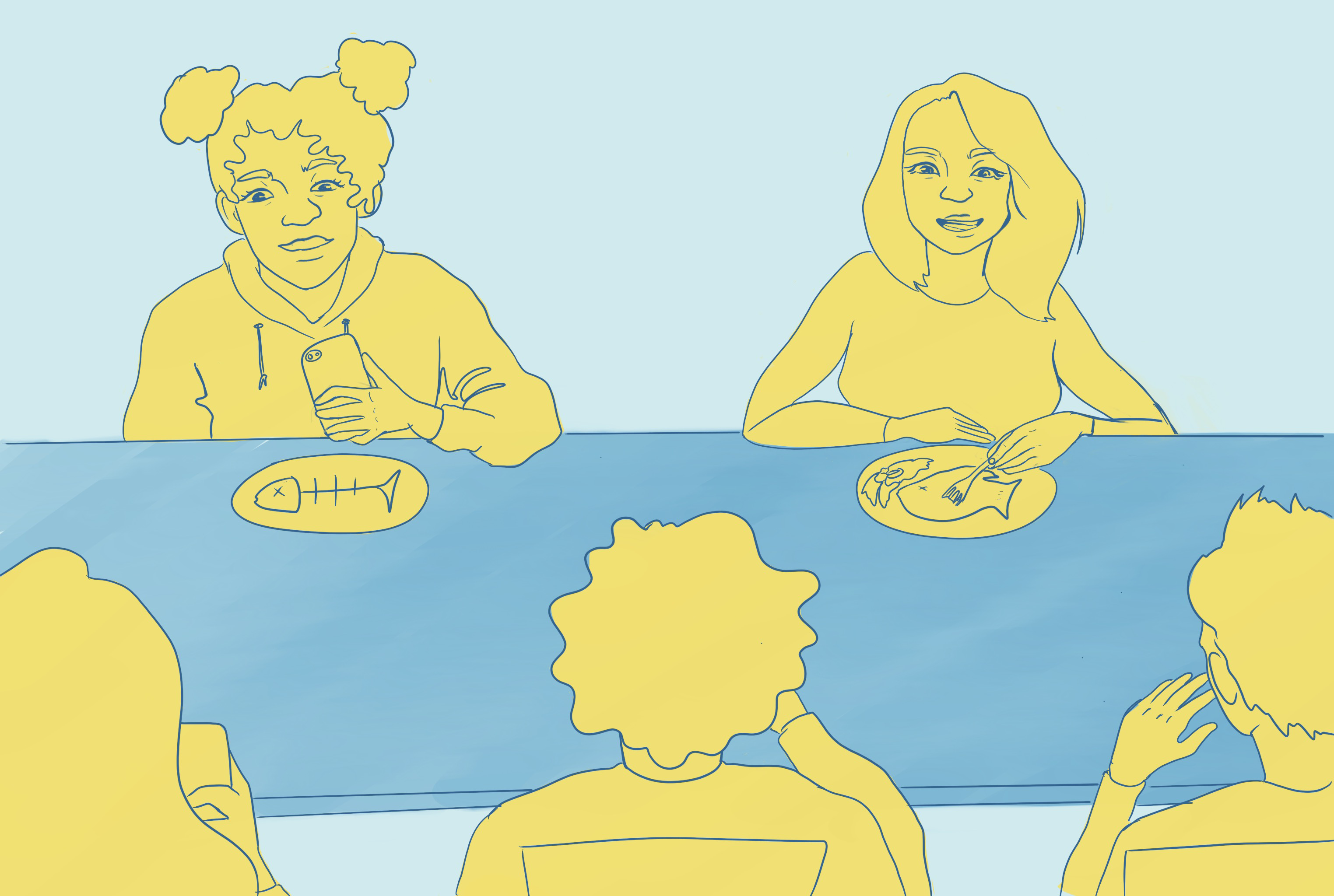UCLA Dining Services increases sustainably sourced seafood on menu

(Sarah Goldacker/Daily Bruin)
By Hedy Wang
March 11, 2018 10:37 p.m.
UCLA dining halls have been serving more seafood in place of red meat in order to comply with the campus’ sustainability goals and to offer healthier options for students.
UCLA Dining Services said in a statement that it made the change fall quarter because of the nutritional value of seafood. It added that fish contain important fats, proteins and nutrients that are essential to a healthy diet, and said it will serve red meat in smaller portions.
The change was also driven by sustainability goals. Dining Services is striving to sustainably source at least 20 percent of its food by 2020, according to the UCLA Sustainability website. The most recent data shows that approximately 19 percent of food purchases came from sustainable sources in the 2015-2016 school year.
Al Ferrone, senior director of Dining Services, said in an email that dining management sources fish from Santa Monica Seafood and Kanaloa Seafood and follows the Monterey Bay Aquarium Seafood Watch’s guidelines, which help consumers find sustainable seafood options.
“Santa Monica Seafood is pretty much the best in the business in LA,” Mark Gold, associate vice chancellor for environment and sustainability at UCLA’s Institute of the Environment and Sustainability said. “I think it’s great for the students (as) a learning opportunity but also a good statement for a university of our stature to say we’re only going to eat sustainable seafood,” he said.
Madison Feldman, undergraduate coordinator of the Healthy Campus Initiative, said the change is a part of the Menus of Change initiative, a coalition of culinary administrators from a variety of university campuses who create menus that are both environmentally responsible and healthy. Dining Services first implemented the Menus of Change program at Bruin Plate, and its success with students led to its expansion to other dining halls, Feldman said.
“The new program (is) a growing process with other campuses between their chefs and their culinary directors and coming up with different recipes to try to figure out ways to incorporate different exotic and unthought-of fish that are more sustainable,” she said.
Feldman said Dining Services is also trying to use trash fish, also called rough fish, which are not commonly desired by consumers, but are still caught by fishermen.
“Trash fish are typically overlooked, outside the big three of shrimp, salmon and tuna,” she said. “It’s something we don’t commonly eat but is still delicious.”
Gold said he thinks adding more fish to the menu makes the campus more sustainable by reducing the large carbon footprint of sourcing red meat and ensures that food purchases do not harm ecosystems. A Natural Resources Defense Council article said beef accounts for 34 percent of the carbon emissions of the U.S. diet in 2014, the largest source of any other food group.
Gold added it is important to evaluate how seafood is caught and to not just focus on the species of the fish. The use of trawling, which involves pulling a fishing net behind a boat, and certain kinds of nets, such as gill nets, can be destructive to ecosystems, he said. These methods can physically destroy seabeds and catch and harm unwanted animals, according to Seafood Watch’s website.
“There are some species of fish that if it’s caught one way (it’s sustainable) and if it’s caught another way, it’s not,” Gold said.
UCLA executive chef Joey Martin said the administration is only serving fish that have been certified as sustainable by the Aquaculture Stewardship Council and the Marine Stewardship Council, or endorsed by Seafood Watch.
Several students said that they think the change is a good idea, and they did not notice the reduction in red meat.
Shirley Nan, a third-year economics student, said she likes the taste of seafood and believes it is healthier than other sources of protein.
Marjorie Llanera, a second-year psychology student, said she did not immediately notice the menu change since it was implemented in the fall, but is excited about some of the new seafood dishes.
”I will go to Covel (dining hall) if I know they are serving the salmon. I really like it,” she said.
Sam Leong, a third-year English student, said he has benefitted from the change because he does not enjoy eating red meat often.
”I like how there’s more seafood options, … certain other choices of (red meat) I’m not fond of,” he said.

